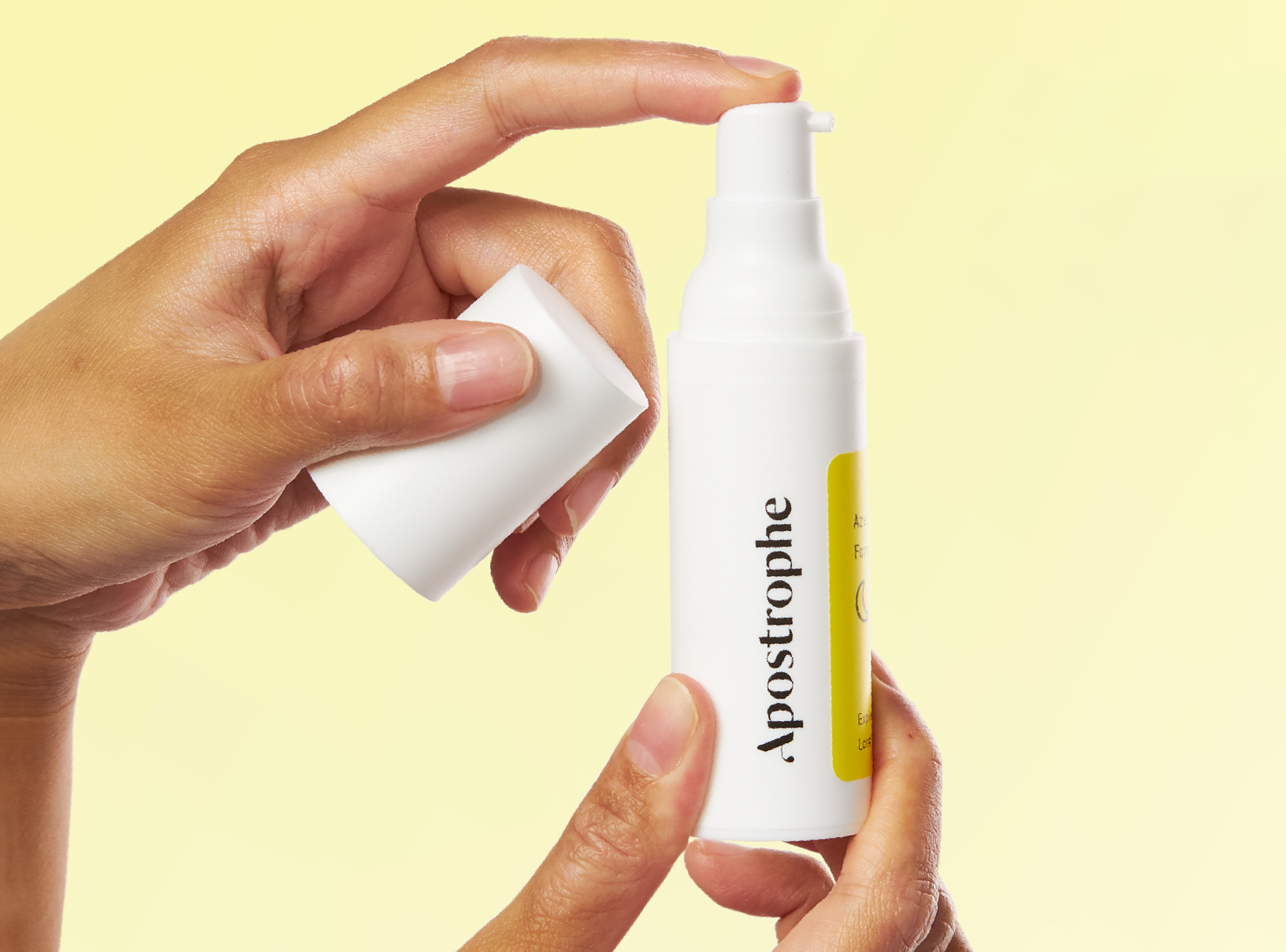Education
Does vitamin C help acne?


SHARE
Education
Does vitamin C help acne?
Medically reviewed by Mary Lucas, RN
Written by Apostrophe Team
Last updated 11/3/2024
Vitamin C is known for its benefits to healthy skin and the fight against premature aging, but its abilities with respect to acne are, frankly, underappreciated.
Forms of vitamin C are great for your skin, and the right vitamin C product might help treat persistent acne.
There are limits, of course — skin care products aren’t magic, and topical vitamins are only part of the solution.
But we have a feeling after learning more about what vitamin C can do for you, you’ll be adding another letter of the alphabet to your skin care routine.
What Vitamin C Does
Vitamin C is a water-soluble nutrient that, in the body, functions primarily as a potent antioxidant. It is sometimes referred to as L-ascorbic acid.
The effects of Vitamin C include helping your body combat free radical damage, which are damaging compounds created in a number of ways that can harm your cells and cellular function.
Vitamin C also helps you produce more collagen and can help in processes like wound healing.
A typical adult needs between 75mg and 90mg daily of dietary vitamin C for their needs, which primarily comes from fruits and vegetables — most typically citrus — that can either have natural vitamin C or be fortified with it.
Vitamin C supplementation is also effective in certain cases.
These effects even have benefits for some types of acne.
There are different acne types, which you can learn more about in our guide to the Types of Acne.
Depending on which type of acne you have, you may be dealing with an infection, inflammation, or less-than-efficient cell production.
Vitamin C, it turns out, can help with all of this.
How Vitamin C Affects Your Skin: Benefits
Vitamin C acts as a powerful antioxidant to fight free radicals caused by things like UV rays, smoke, and other environmental pollutants, which can hinder normal production of new cells and collagen in the dermis.
These are key components for keeping your skin looking vibrant and glowy — and acne-free.
Less vitamin C leaves human skin unable to fight the effects of free radicals.
But that’s not all that you’re missing out on with insufficient vitamin C. Take a look at some of vitamin C’s acne-fighting benefits in brief:
Wound Healing
Vitamin C has been shown in studies to speed up the effectiveness of your body’s system for dealing with wounds.
While acne might not resemble lacerations from a slasher film, those little inflamed welts can end up becoming open wounds — especially if you pick at them.
The point being that vitamin C can help repair the damage. Vitamin C can also reduce the appearance of acne scars and even out skin tone concerns.
Fight Wrinkles
Okay, this doesn’t obviously pertain to acne, but vitamin C’s ability to reduce wrinkles promotes healthier skin, which translates to fewer signs of aging generally.
The same factors that help with wrinkles also reduce the likelihood of acne, too. That’s aside from vitamin C’s proven correlation with increased collagen production, by the way.
Fight Dry Skin
As a topical vitamin, vitamin C can combat wrinkles and acne alike by reducing dry skin, which left unchecked can cause dead skin cells to build up in your pores.
This is the first step in an acne outbreak, so while it may not fix existing acne, it can prevent some future acne from even happening.
Fight Inflammation
Perhaps the most important effect of vitamin C is its ability to reduce inflammation. Reducing inflammation can manage certain types of acne, keep your skin functioning at its most efficient levels, and keep you looking good.
More importantly, anti-inflammatory properties can help with dryness, itching, and other issues that may indirectly cause acne flare-ups later on.
Other Ways of Treating Acne
Vitamin C can help you combat everything from acne to fine lines and signs of skin aging.
But vitamin C is not a solo skin hero. There are other ways to treat acne, many of which can be used in combination with vitamin C. They include:
Topical Retinoids
Retinoids can help fight a variety of skin issues, including inflammatory acne. They can also be used as a maintenance treatment for skin health and glow.
Tretinoin is one of the most commonly used retinoids — it’s effective at reducing dead skin cells, and has been used safely for decades. It usually requires a prescription.

PRESCRIPTION TRETINOIN
Target acne, dark spots, and signs of aging with this science-backed ingredient.
There are bonus benefits to topical retinoids, like how tretinoin has been shown to aid in collagen synthesis too.
Antibiotics
Antibiotics undermine the bacteria that contribute to the development of acne, and the right one can be just what your skin needs to support its fight against a particularly insistent case of inflammatory acne.
Salicylic Acid
Salicylic acid is a compound that has several beneficial properties for skin care.
It’s effective at removing dead skin cells (exfoliating), and is known to have antifungal as well as antibacterial effects. It also possesses anti-inflammatory benefits as well.
It’s also more readily accessible than some retinoids because it’s available over the counter.
Benzoyl Peroxide
A topical disinfectant like benzoyl peroxide has similar peel-like properties to retinoids but with the advantage of killing bacteria.
Side effects like burning, dryness, and peeling or stinging may occur but are typically mild.
TL;DR: Vitamin C and Acne
The acne fight doesn’t stop with the right product, and while vitamin C is a great ally to have on your side, there’s a lot more available to help you hone your skin care.
Topical retinoids, salicylic acid, and even certain antibiotics are just a few of these treatments.
A serum with vitamin C may benefit your skin, especially if paired with a retinoid. The best way to find out what will work, however, is to seek professional support from a healthcare professional.
You may be able to get your daily vitamin C at the breakfast table but don’t stick with the home remedies if your acne is out of control. Help is available—talk to a dermatology provider and reclaim the face you love.
References:
Yoham AL, Casadesus D. Tretinoin. [Updated 2020 Dec 5]. In: StatPearls [Internet]. Treasure Island (FL): StatPearls Publishing; 2021 Jan-. Available from: https://www.ncbi.nlm.nih.gov/books/NBK557478/.
Fox, L., Csongradi, C., Aucamp, M., du Plessis, J., & Gerber, M. (2016). Treatment Modalities for Acne. Molecules (Basel, Switzerland), 21(8), 1063. https://www.ncbi.nlm.nih.gov/pmc/articles/PMC6273829/.
Pullar, J. M., Carr, A. C., & Vissers, M. (2017). The Roles of Vitamin C in Skin Health. Nutrients, 9(8), 866. https://www.ncbi.nlm.nih.gov/pmc/articles/PMC5579659/.
Bilodeau, K. (2020, November 11). Skin serum: What it can and can't do. Retrieved January 30, 2021, from https://www.health.harvard.edu/blog/skin-serum-what-it-can-and-cant-do-2018061214029.
Rodan, K., Fields, K., Majewski, G., & Falla, T. (2016). Skincare Bootcamp: The Evolving Role of Skincare. Plastic and reconstructive surgery. Global open, 4(12 Suppl Anatomy and Safety in Cosmetic Medicine: Cosmetic Bootcamp), e1152. https://doi.org/10.1097/GOX.0000000000001152. Retrieved from https://www.ncbi.nlm.nih.gov/pmc/articles/PMC5172479/.
Jegasothy, S. M., Zabolotniaia, V., & Bielfeldt, S. (2014). Efficacy of a New Topical Nano-hyaluronic Acid in Humans. The Journal of clinical and aesthetic dermatology, 7(3), 27–29. Retrieved from https://www.ncbi.nlm.nih.gov/pmc/articles/PMC3970829/.
U.S. Department of Health and Human Services. (n.d.). Office of dietary supplements - vitamin C. NIH Office of Dietary Supplements. Retrieved November 9, 2021, from https://ods.od.nih.gov/factsheets/VitaminC-Consumer/.
Gianeti, M. D., Gaspar, L. R., Camargo, F. B., Jr, & Campos, P. M. (2012). Benefits of combinations of vitamin A, C and E derivatives in the stability of cosmetic formulations. Molecules (Basel, Switzerland), 17(2), 2219–2230. https://doi.org/10.3390/molecules17022219. Retrieved from https://www.ncbi.nlm.nih.gov/pmc/articles/PMC6268122/.
Telang P. S. (2013). Vitamin C in dermatology. Indian dermatology online journal, 4(2), 143–146. https://doi.org/10.4103/2229-5178.110593. Retrieved from https://www.ncbi.nlm.nih.gov/pmc/articles/PMC3673383/
Like what you just read? Sign up for our email list to get the scoop on skincare science delivered straight to your inbox.

Deep Dives
A dermatologist shares his thoughts on the recent studies about benzoyl peroxide and benzene.
Read More
Education
What is milia?
What is milia? Today, we’re jumping into one type of bump that you may have heard about most commonly in infants — milia.
Read More
Education
Best moisturizer for acne-prone skin
If you have combination acne-prone skin, figuring out which moisturizer is best for your skin might be tough. In this guide, we break down the best moisturizer for combination, acne-prone skin.
Read More
